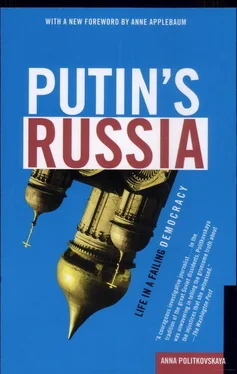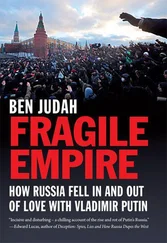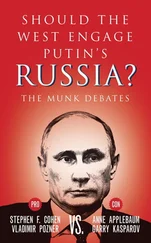Hasuhanov reported all this to Maskhadov, and the director of the military audit office immediately ran into trouble with the president’s security forces, who were involved in all phases of the embezzlement. After Hasuhanov had worked in the military audit office for just a week, Maskhadov appointed him chief of staff, simply because he needed honest people around him.
It was the end of July 1999. Chief of Staff Hasuhanov began work in August, a few days before the start of the second Chechen war, in which he refused to take part.
As you read the record of the court hearings (which took place behind closed doors), you cannot help feeling that the trial was a put-up job. Someone had decided that Hasuhanov had to be sent down for a very serious offense, but no one would characterize that offense. Had Hasuhanov, back in 1999, found out something that came back to haunt him three or four years later? Was it the secret of those embezzled federal funds? There is even some suspicion that the fraud itself was, to a large extent, the reason the second Chechen war was started, perhaps a war to ensure that the tracks of the wrongdoers would be covered forever. And is this a reason why the upper echelons of Russia’s armed forces are still so set against peace negotiations?
Here is a further quote from the indictment:
Hasuhanov was actively involved in the work of the IAF and in 1999 was engaged in matters relating to the financing of the IAF. He devised and implemented an auditing system for the financial resources provided to maintain the National Guard, general headquarters, and Ministry of Internal Affairs IAFs of the self-proclaimed “Republic of Ichkeria.” Having demonstrated organizational ability and efficiency in this position, Hasuhanov was appointed by Maskhadov to the post of his chief of staff in late July 1999. Actively engaged in the work of the above-named IAF, Hasuhanov was involved in formulating the basic decisions relating to opposition to the forces of the federal government, by means that included armed opposition, in its task of restoring constitutional order to the territory of the CRI.
The charge would be laughable if we did not know the price exacted from Hasuhanov for this brazen falsification of history by the forces of the FSB.
From the record of the court hearing:
“Tell the court what necessity there was for you personally to be in Chechnya from the beginning of combat operations until the day of your arrest.”
“I did not consider it possible to turn my back on Maskhadov because I considered him the legally elected president. I could not stop the war and did everything in my power…. I sometimes fulfilled his requests. I was not in a fit condition to march through the forests, but what I could do I did. I saw people dying. I know what is meant by ‘restoring constitutional order.’ I will not conceal the fact that this entire war is genocide. However, I never called for the carrying out of acts of terrorism.”
“Did you call for the killing of federal troops?”
“In order to call for that, I would have had to have men under my command. I had no men under my command.”
“Were any of the field commanders directly subordinate to you?”
“No.”
In front of me I have documents marked OFFICIAL USE ONLY. When he was preparing the court case, Cherepnev sent out inquiries to every local FSB department in Chechnya requesting information on terrorist acts committed in its district on “combat instructions from Chief of the Operational Headquarters of the Armed Forces of the CRI Hasuhanov.” Recall the “combat instructions” Hasuhanov signed during his interrogation: blank sheets of paper, on which Cherepnev then wrote in whatever he wanted. Not surprisingly, every local department head replied that Hasuhanov was not wanted for any terrorist acts. These responses came back to Cherepnev not from Chechen fighters but from his own people.
The negative feedback did not, however, halt the machinery that was to proclaim the guilt of “a leading member of the IAF,” as Hasuhanov, after he had survived, now began to be called. The court paid not the slightest attention to this pile of papers for OFFICIAL USE ONLY, and neither did the prosecutor general’s office.
The Trial
The Hasuhanov case was heard behind closed doors and at great speed, from January 14 to February 25, 2003, in the Supreme Court of the Republic of North Ossetia—Alaniya, Judge Valerii Dzhioyev presiding. The court found nothing untoward—not in the fact that the accused had had no access to a lawyer for six months, or that the lawyer invited to act on his behalf had been chosen by those who had been beating his client, or that there was no information on the whereabouts of the accused between April 20 and 27. The court noted that he had been tortured but had no comment to make on the subject. Here is a quote from the verdict:
Hasuhanov made no admission of guilt during the investigation but under physical and psychological pressure from officers of the FSB was forced to sign previously prepared records of the interrogations.
“You have said that violent means were used against you,” the judge told Hasuhanov. “Can you give the names of those who used violent means against you?”
“I cannot give their names because I do not know them.”
The court passed over this detail, since the torturers had failed to identify themselves to their victim. It even refused to commission a medical report, despite the fact that the accused had a dent in his skull. The court confined itself to asking Tebloev, the director of the timber factory, whether Hasuhanov had stayed in his hospital section. He replied, “Yes. He was there from May 3 until September 2002 with a broken rib cage.” The court took this information in stride. To quote again from the verdict:
At the court hearing the accused, Hasuhanov, did not admit to being guilty of the crimes committed. He stated that he considered it his duty to carry out certain requests and missions for the legally elected President Maskhadov. He denied making preparations for the committing of terrorist acts or providing financial resources for field commanders. He acknowledged only that he authenticated certain orders and instructions of Maskhadov, annotating them “True copy” in his own hand.
Was that it?
Yes, that was it. The sentence was twelve years in a strict-regime labor camp without eligibility for amnesty. The prisoner’s final comment was, “I wish to state that I have no intention of repudiating my beliefs. I consider what is going on in Chechnya to be a flagrant violation of people’s rights. Nobody makes any attempt to catch the real criminals. While the present situation continues, there will be many more people like me in the dock.”
THE SHROUD OF darkness from which we spent several decades during the Soviet era trying to free ourselves is enveloping us again. More and more stories are heard of the FSB using torture to fabricate cases to suit its ideological needs, implicating the courts and the prosecutor’s office as its accomplices. This practice is now the rule rather than the exception. We can no longer pretend that the occurrences are random.
The implication is that our constitution is on its deathbed, in spite of the guarantees intended to safeguard it, and the FSB is in charge of the funeral arrangements.
When I learned that Hasuhanov had been brought to the notorious Krasnaya Presnya transit prison in Moscow, a kind of distribution center from which those already sentenced are sent off in convoys to other parts of the country, I rang the Moscow office of the International Red Cross. Those who work there are among the few people allowed to visit particular prisoners. I called because I knew that after the torture Hasuhanov had endured, he was in poor health indeed. I asked the agency to visit him in Krasnaya Presnya, to provide him with medicine, to ask the prison authorities to ensure that he received treatment, and to get their consent for regular visits.
Читать дальше





![Stephan Orth - Behind Putin's Curtain - Friendships and Misadventures Inside Russia [aka Couchsurfing in Russia]](/books/415210/stephan-orth-behind-putin-s-curtain-friendships-a-thumb.webp)






